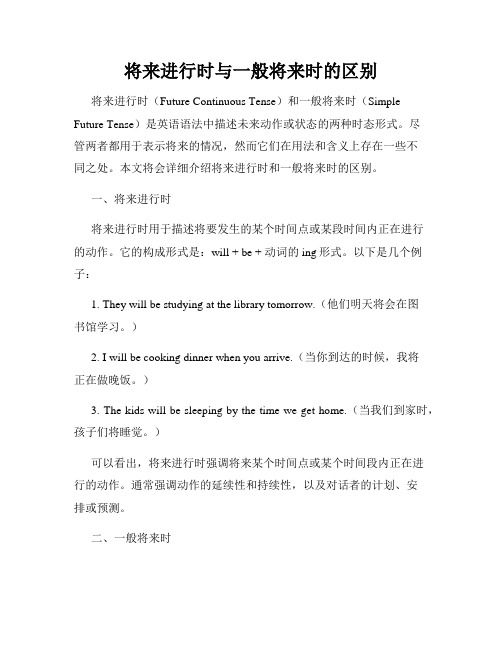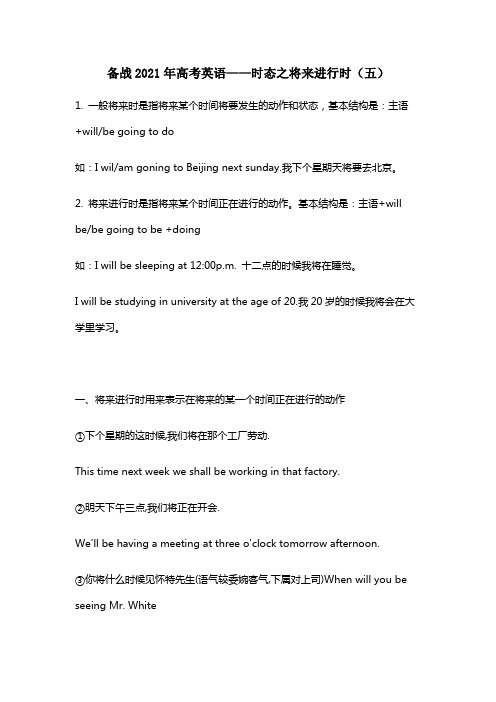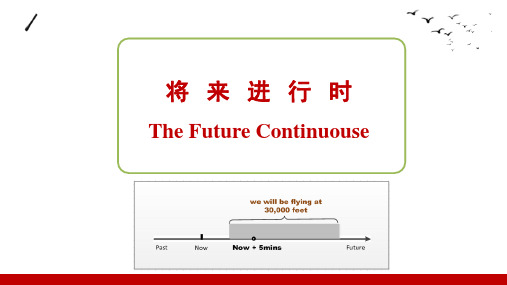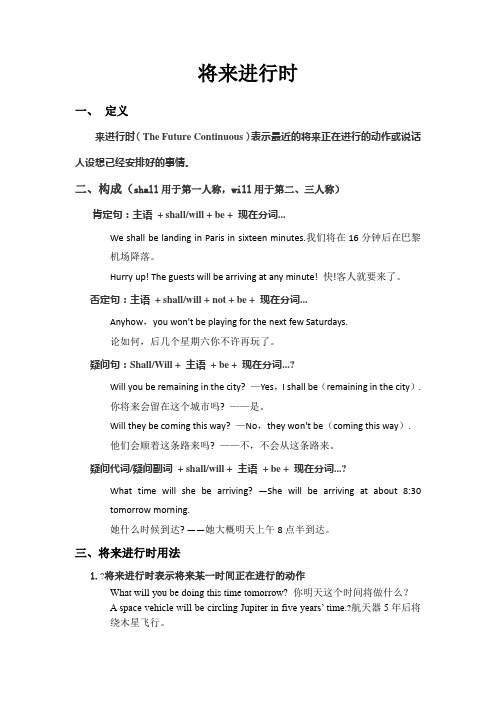英语将来进行时讲解
将来进行时与一般将来时的区别

将来进行时与一般将来时的区别将来进行时(Future Continuous Tense)和一般将来时(Simple Future Tense)是英语语法中描述未来动作或状态的两种时态形式。
尽管两者都用于表示将来的情况,然而它们在用法和含义上存在一些不同之处。
本文将会详细介绍将来进行时和一般将来时的区别。
一、将来进行时将来进行时用于描述将要发生的某个时间点或某段时间内正在进行的动作。
它的构成形式是:will + be + 动词的ing形式。
以下是几个例子:1. They will be studying at the library tomorrow.(他们明天将会在图书馆学习。
)2. I will be cooking dinner when you arrive.(当你到达的时候,我将正在做晚饭。
)3. The kids will be sleeping by the time we get home.(当我们到家时,孩子们将睡觉。
)可以看出,将来进行时强调将来某个时间点或某个时间段内正在进行的动作。
通常强调动作的延续性和持续性,以及对话者的计划、安排或预测。
二、一般将来时一般将来时用于描述将来发生的动作或事件,通常没有强调动作的延续性或持续性。
它的构成形式是:will + 动词的原形。
以下是几个例子:1. I will visit my grandmother next week.(我下周会去看望我的奶奶。
)2. The concert will start at 8 PM tonight.(今晚音乐会将在8点开始。
)3. She will call you as soon as she arrives.(她一到就会给你打电话。
)可以看出,一般将来时用于描述将来某个时间发生的动作或事件,并没有强调动作的持续性。
通常表示意愿、承诺、预测、计划或预测。
三、1. 强调不同:将来进行时强调动作的持续性和延续性,而一般将来时则没有这种强调。
备战2021年高考英语——时态之将来进行时(五)

备战2021年高考英语——时态之将来进行时(五)1. 一般将来时是指将来某个时间将要发生的动作和状态,基本结构是:主语+will/be going to do如:I wil/am goning to Beijing next sunday.我下个星期天将要去北京。
2. 将来进行时是指将来某个时间正在进行的动作。
基本结构是:主语+will be/be going to be +doing如:I will be sleeping at 12:00p.m. 十二点的时候我将在睡觉。
I will be studying in university at the age of 20.我20岁的时候我将会在大学里学习。
一、将来进行时用来表示在将来的某一个时间正在进行的动作①下个星期的这时候,我们将在那个工厂劳动.This time next week we shall be working in that factory.②明天下午三点,我们将正在开会.We'll be having a meeting at three o'clock tomorrow afternoon.③你将什么时候见怀特先生(语气较委婉客气,下属对上司)When will you be seeing Mr. White④今天晚上七点,学生们将正在看电视.The students will be watching TV at seven this evening.二、将来进行时主要表示将来某一时刻正在进行的动作,或表示要在将来某一时刻开始,并继续下去的动作。
常用来表示礼貌的询问,请求等。
例如:1)This time next day they will be sitting in the cinema.用法:强调在将来的某个具体时间正在发生的动作或事情.例:Don't worry, you won't miss her. She will be wearing a red T-shirt and a white skirt at that time.别担心,你不会认不出她的.她到时会穿一件红色的T恤衫和一条白色的短裙. 例:This time tomorrow you ________ there doing some more exercises. A) will sit B) will be sitting C) sit D) shall sit答案是B).因为this time tomorrow是个很具体的将来时间.三、将来进行时用来表示不含意图又未发生的动作注意:将来进行时不用于表示"意志",不能说I'll be having a talk with her.I will be helping Mary tomorrow.明天我帮玛丽干活.这不表示说话人已安排好要帮助玛丽或者想帮助她.这个句子仅仅说明这一动作将要发生.将来进行时的这种用法有些像表示将来的现在进行时,但有以下几点不同之处.四、表示委婉的请求When shall we be meeting again?五、与现在进行时态的区别现在进行时表示一种经过考虑的,将来要进行的动作,而将来进行时通常表示正常过程中会发生的动作,因此将来进行时不如现在进行时那样肯定,比后者偶然性要大一些:I am seeing Tom tomorrow. 明天我要和汤姆见面.I'll be seeing Tom tomorrow. 明天我会见到汤姆.第一句意指汤姆或说话人已经特意安排了这次会面,而第二句则意指汤姆和说话人将在通常进程中见面(也许他们在一起工作).不过这种差别并不是在任何情况下都很重要,而且常常两者都可以使用.现在进行时用于表示最近将来的动作时,必须有确定的时间,而将来进行时可以和确定的时间状语连用,也可以不连用. 它既可以表示最近将来的动作,也可以表示较远将来的动作.可以说:I am meeting him tomorrow. 我明天和他会面.I'll be meeting him tomorrow/next year/some time/. 我明天/明年/某时将与他会面.六、与一般将来时态的区别将来进行时通常表示的是对将来事实的简单陈述.而will+V. (一般将来时)除表示时间概念外,还带有感情色彩.e.g. 汤姆明天将正在割草. Tom will be cutting grass tomorrow.汤姆明天愿意割草. Tom will cut the grass tomorrow.巩固练习1. This time tomorrow, Maria ____ (sunbathe) on a beach.2. Wake me up by nine o'clock - I ____ (sleep) long enough by then.3. We ___(not / work) next week. We'll be on holiday.4. It's strange that when we get to Sydney, we ____(fly) half way round the world.5. Don't phone me between 7 and 8. We ____ (have)dinner then.6. Phone me after 8 o'clock. We ____ (finish)dinner by then.7. Tomorrow afternoon we're going to play tennis from 3 o'clock until 4.30. So at 4 o'clock, we ____(play) tennis.8. Do you think you ____(still/do) the same job in ten years' time?9. By the time you get home I ____(clean) the house from top to bottom.10. Tom is on holiday and he is spending his money very quickly. If he continues like this, he ____(spend) all his money before the end of his holiday.答案及句子翻译1. will be sunbathing明天的这个时候,玛丽会在沙滩上晒日光浴。
将来进行时与一般将来时的异同

将来进行时与一般将来时的异同将来进行时和一般将来时是英语中表示将来的两种时态。
尽管它们都表示将来的动作或状态,但它们在用法和意义上有一些不同之处。
本文将比较这两个时态的异同点。
一、将来进行时将来进行时表示将来某一时刻或时间段内正在进行的动作。
它的构成形式为“will be + 现在分词”。
1. 表示将来某一时刻的动作:例句:I will be studying for the exam tomorrow evening.(明天晚上我将在学习准备考试。
)2. 表示将来某一时间段内的动作:例句:At this time next week, we will be celebrating our anniversary.(下周的这个时候,我们将在庆祝我们的纪念日。
)将来进行时通常用来描述已经计划或决定要做的事情以及按照计划将要发生的事情。
二、一般将来时一般将来时表示将来的动作或状态,用于客观陈述或预测未来的事件。
它的构成形式为“will + 动词原形”。
1. 表示将来的动作:例句:He will visit his grandparents next month.(他下个月将拜访他的祖父母。
)2. 表示将来的状态:例句:She will be a doctor in the future.(她将来会成为一名医生。
)一般将来时常用来表示根据目前的情况或经验预测未来将要发生的事情。
三、1. 异同点:(1)时间表述:将来进行时通常使用某一具体时间点或时间段,而一般将来时一般没有具体时间表述。
例句:I will be attending a conference at 10 a.m. tomorrow.(明天上午10点我将参加一场会议。
)I will attend a conference in the future.(我将来会参加一场会议。
)(2)动作性质:将来进行时重点在于动作的进行过程,而一般将来时重点在于动作的结果或状态。
(完整版)将来进行时的结构

(完整版)将来进行时的结构(完整版)将来进行时的结构将来进行时是英语中表示将来某一时刻会进行的动作的时态。
它的结构是由“will be + 现在分词”组成。
一、使用情景将来进行时常用于以下情况:1. 表示将来的计划或安排,如:- Tomorrow afternoon, I will be attending a meeting.明天下午,我将参加一个会议。
- Next week, she will be traveling to Europe.下周,她将去欧洲旅行。
2. 表示将来某一特定时间正在进行的动作,如:- By this time tomorrow, I will be working on my presentation.明天这个时候,我将正在做我的演讲稿。
- At 8 PM tonight, they will be having dinner with their friends.今晚8点,他们将正在和朋友一起吃晚饭。
3. 表示预测的将来状态,如:- In a few years, renewable energy will be replacing fossil fuels.几年后,可再生能源将取代化石燃料。
- By 2030, most cars will be running on electricity.到2030年,大部分汽车将使用电力。
二、注意事项1. 使用将来进行时时需注意动词的变化,即将动词的基本形式加上-ing。
但也有一些特殊情况,如动词以“e”结尾,则需将“e”改为“ing”,或者以辅音字母+y结尾,将“y”改为“i”,再加上“ing”等。
2. 将来进行时通常与将来时态连用,即使用“will”作为助动词。
3. 在肯定句中,将来进行时结构为“主语 + will be + 现在分词”。
否定句和疑问句的构成如下:- 否定句:主语 + will not be + 现在分词- 疑问句:Will + 主语 + be + 现在分词?三、例句1. This time next week, I will be enjoying my vacation on the beach.到下周的这个时候,我将正享受在海滩度假。
英语语法-将来进行时

The Future Continuouse
1 将来进行时的定义
1.将来进行时表示将来某一时刻或某一段时间内可能正在 进行或发生的动作。
通常句子一定会有一个“表示将来某个时间点”的状语。 如: She will be doing her homework at 8 p.m. tonight.
2. I hope scientists _w__il_l_f_in_d_ (find) a cure for cancer.
3. A Chinese astronaut _w__il_l_r_e_a_c_h(reach)
Mars by 2050.
注意: 用于将来进行时的谓语动词必须是可延 续性动词, 短暂性动词则不可, 如上面5, 6题。
2 将来进行时的结构
主语 + shall/will+be +v.-ing + 其它
肯Байду номын сангаас 形式
will + be doing
否定 形式
will + not + be doing
问句 形式
will+主+ be doing?
He will be sleeping at this time tomorrow night.
He will be playing tennis at this moment tomorrow .
1 将来进行时的定义
2.将来进行时表示已经决定或安排好的要发生的动作或事 情;表示按预测将会发生的事情。
如: She will be coming soon. I'll be meeting him sometime in the future.
英语将来进行时讲解

将来进行时一、定义来进行时(The Future Continuous)表示最近的将来正在进行的动作或说话人设想已经安排好的事情。
二、构成(shall用于第一人称,will用于第二、三人称)肯定句:主语+ shall/will + be + 现在分词...We shall be landing in Paris in sixteen minutes.我们将在16分钟后在巴黎机场降落。
Hurry up! The guests will be arriving at any minute! 快!客人就要来了。
否定句:主语+ shall/will + not + be + 现在分词...Anyhow,you won't be playing for the next few Saturdays.论如何,后几个星期六你不许再玩了。
疑问句:Shall/Will + 主语+ be + 现在分词...?Will you be remaining in the city? —Yes,I shall be(remaining in the city).你将来会留在这个城市吗? ——是。
Will they be coming this way? —No,they won't be(coming this way).他们会顺着这条路来吗? ——不,不会从这条路来。
疑问代词/疑问副词+ shall/will + 主语+ be + 现在分词...?What time will she be arriving? —She will be arriving at about 8:30tomorrow morning.她什么时候到达? ——她大概明天上午8点半到达。
三、将来进行时用法1.?将来进行时表示将来某一时间正在进行的动作What will you be doing this time tomorrow? 你明天这个时间将做什么?A space vehicle will be circling Jupiter in five years’ time.?航天器5年后将绕木星飞行。
高三英语将来进行时
高三英语将来进行时将来进行时一、概念将来进行时主要表示将来某一时间正在进行的动作,或表示要在将来某一时间开始,并继续下去的动作。
常用来表示礼貌的询问、请求等。
二、将来进行时的形式将来进行时由“动词be的将来时+现在分词”构成,具体形式见下表:人称单数复数第一人称I shall/will be leaving.We shall/will be leaving.第二人称You will be leaving.You will be leaving.第三人称He/She/It will be leaving.They will be leaving.三、将来进行时的用法将来进行时表示在将来某一时间内正在进行的动作。
将来进行时有很强的推测性,因此人们往往在以下几种场合中使用它:1. 表示将来某一时间正在进行的动作,一般带状语。
例如:What will you be doing axt Monday?下周一的这个时候你将做什么了?Wuw, I will be writing 明天他来我家时,我将在写报告。
2. 表示现在正在进行的动作,但这个动作会延续到将来。
例如:I wondwill still be raining this a我想知道今天下午是否还会一直下雨。
Iat she will be workingxuntil nexg.我想她会一直在做这个实验直到第二天早上。
3. 表示预定的将来动作或对将来的预测。
例如:Tomorrow I will be flying to </st1:明天我将飞往孟买。
After you tadu will be feeling much b吃完药后,你会感觉好很多。
4. 表示委婉的请求。
例如:When shall we bg again?我们什么时候能再见面?5. 表示原因。
例如:Pleaw aTomorrow morning, I'll be having a meeting. 明天下午快点来。
初中英语将来进行时详细讲解
初中英语将来进行时详细讲解将来进行时是英语中一种表示将来某一时间点或某一段时间正在进行的动作或状态的时态。
它由"will be + 动词-ing"构成。
将来进行时的用法如下:1. 表示将来某一时间点进行的动作:①I will be studying at 8 o'clock tomorrow morning.(明天早上8点钟,我将在学习。
)2. 表示将来某一段时间内进行的动作:①They will be traveling around Europe for a month next summer.(他们将在明年夏天旅行一个月的时间周游欧洲。
)3. 表示将来某一时间点正在进行的状态:①She will be waiting for you at the airport when you arrive.(当你到达时,她将在机场等待你。
)将来进行时常与表示将来某一时间点的时间状语连用,以明确动作发生的时间。
例如:①At this time tomorrow, I will be having dinner with my family.(明天这个时间,我将和我的家人一起吃晚饭。
)将来进行时也可以与其他动词时态连用,如将来进行时和将来完成时,表示将来某一时间点发生的动作正在进行,并有另一个动作已经完成。
例如:①By the time she arrives, we will be waiting for her at the train station.(她到达时,我们将在火车站等待她。
)将来进行时并不常用于表示计划、安排或意愿。
对于这些情况,一般使用将来时。
同时,将来进行时也不常用于肯定句中,更常用于疑问句或否定句中,表示对未来的不确定性或推测。
高中英语将来进行时的语法知识点详解
⾼中英语将来进⾏时的语法知识点详解 在英语的学习中学⽣会学习到好多种的时态,这些是学⽣过⽐较容易混淆的知识点,下⾯店铺的⼩编将为⼤家带来关于将来进⾏时的语法知识点的介绍,希望能够帮助到⼤家。
⾼中英语将来进⾏时的语法知识点 ⼀、结构形式 过去完成进⾏时由“will / shall have been+现在分词”构成。
⼆、⽤法归纳 ⽤法⼀:表⽰动作从某⼀时间开始⼀直延续到将来某⼀时间,⾄于是否继续下去,要视上下⽂⽽定。
如: She will have been having treatment all her life. 她将终⽣受到治疗。
By the end of next month he will have been here for ten years. 到下⽉底,他在这⼉就够⼗年了。
By this time next year, we will have been doing business with each other for 20 years. 到明年这时候,我们的业务住来就满20年了。
By the end of this year he’ll have been acting for thirty years. 到今年年底他当演员就满30年了。
⽤法⼆:表⽰⼀种经常性反复进⾏的持续性动作。
如: By the end of this month he will have been training horses for twenty years. 到了这个⽉底他驯马就满20年了。
By the end of this month he will have been climbing mountains for twenty years. 到了这个⽉底他登⼭就满20年了。
⾼中英语过去将来完成进⾏时的语法知识点 ⼀、结构形式 过去完成进⾏时由“would have been+现在分词”构成。
英语中将来进行时的用法讲解
英语中将来进行时的用法讲解将来进行时will (shall)be+动名词(v+ing)主语第一人称I,we与shall搭配,其余人称均与will搭配,在美式英语里第一人称也与will搭配。
(1)将来进行时,主要表示将来某个时刻正在进行动作I will be sitting on the train to Beijing at 10 tomorrow morning.明天上午10点我就坐在去北京的火车上了。
This time tomorrow evening Grandpa will be having dinner with us.明天晚上这个时候爷爷就会同我们一起吃晚饭了。
Atthat time you will be talking face-to-face with the world’s biggest movie star.到那时你们就在同世界上最大的电影明星面对面地交谈了。
模仿练习:1.昨天晚上这个时候我们将坐在去哈尔滨的飞机上。
2.过一年你将站在讲台上教课了。
3.到那时你会在火炉边同家人共享美好时光(enjoy a good time at the fireside)。
(2)在口语中,将来进行时常常用来表示预计即将发生的动作Tomorrow morning he will be discussing this point with you.明天上午他将同你商量这一点。
We will be expecting you next Sonday.下个星期一我们将恭候您好的到来。
He will be leaving here tonight.今天晚上她就要离开这里。
模仿练习:1.明天晚上我们将谈论这个问题。
2.记住,我会在机场等你的。
3.后天上午珍妮就要离开深圳了。
比较:将来进行时常可与将来一般时交换,不过将来进行时较生动、委婉一些。
例如:I will be waiting for you at the airport.我会在机场(专心、急切地)等着你。
- 1、下载文档前请自行甄别文档内容的完整性,平台不提供额外的编辑、内容补充、找答案等附加服务。
- 2、"仅部分预览"的文档,不可在线预览部分如存在完整性等问题,可反馈申请退款(可完整预览的文档不适用该条件!)。
- 3、如文档侵犯您的权益,请联系客服反馈,我们会尽快为您处理(人工客服工作时间:9:00-18:30)。
将来进行时
一、定义
来进行时(The Future Continuous)表示最近的将来正在进行的动作或说话人设想已经安排好的事情。
二、构成(shall用于第一人称,will用于第二、三人称)
肯定句:主语+ shall/will + be + 现在分词...
We shall be landing in Paris in sixteen minutes.我们将在16分钟后在巴黎机场降落。
Hurry up! The guests will be arriving at any minute! 快!客人就要来了。
否定句:主语+ shall/will + not + be + 现在分词...
Anyhow,you won't be playing for the next few Saturdays.
论如何,后几个星期六你不许再玩了。
疑问句:Shall/Will + 主语+ be + 现在分词...
Will you be remaining in the city —Yes,I shall be(remaining in the city).
你将来会留在这个城市吗——是。
Will they be coming this way —No,they won't be(coming this way).
他们会顺着这条路来吗——不,不会从这条路来。
疑问代词/疑问副词+ shall/will + 主语+ be + 现在分词...
What time will she be arriving —She will be arriving at about 8:30 tomorrow morning.
她什么时候到达——她大概明天上午8点半到达。
三、将来进行时用法
1.将来进行时表示将来某一时间正在进行的动作
What will you be doing this time tomorrow 你明天这个时间将做什么
A space vehicle will be circling Jupiter in five years’ time.航天器5年后将绕木星飞行。
Don’t phone me between 5 and 6. We’ll be having dinner then.五点至六点之间不要给我打电话,那时我们在吃饭。
2. 将来进行时表示表示按时划或安排要发生的动作
I will be seeing you next week. 我下个星期来看你。
I’ll be taking my holidays soon.不久我将度假了。
We shall be going to London next week. 下周我们要去伦敦。
We’ll be spending the winter in Australia. (=we are spending) 我们将在澳大利亚过冬。
3. 将来进行时表示委婉语气
Will you be having some tea 喝点茶吧。
Will you be needing anything else 你还需要什么吗
试比较:
When will you finish these letters
你什么时候会处理完这些信件(如上司对下属)
When will you be seeing Mr White
你什么时候会见到怀特先生(如下属对上司)
4.与一般将来时连用,表稍后的安排。
My duties will end in July and I will be returning to New York in the USA.
我的工作七月结束,之后我将回美国纽约市。
My brother’ll have to take care of you. I’ll call him today and he will be excepting you.我的兄弟一定会照顾你的。
我今天先给他打电话,然后他就会等你。
四、将来进行时与一般将来时的区别
(1) 两者基本用法不一样:将来进行时表示将来某时正在进行的动作,一般将来时表示将来某时将要发生的动作:
What will you be doing this time tomorrow 明天这个时候你会在做什么呢
What will you do tomorrow 你明天干什么
(2) 两者均可表示将来,但用将来进行时语气更委婉,比较:
When will you finish these letters
你什么什候处理完这些信件(直接询问,如上司对下属)
When will you be seeing Mr White
你什么时候见怀特先生(委婉地询问,如下属对上司)
When will you pay back the money 你什么时候还钱(似乎在直接讨债)
When will you be paying back the money 这钱你什么时候还呢(委婉地商量)
(3) 有时一般将来中的will含有“愿意”的意思,而用将来进行时则只是单纯地谈未来情况:
Mary won’t pay this bill. 玛丽不肯付这笔钱。
(表意愿)
Mary won’t be paying this bill. 不会由玛丽来付钱。
(单纯谈未来情况)。
